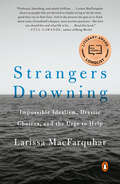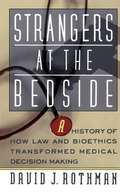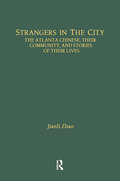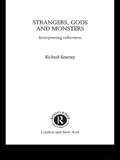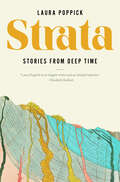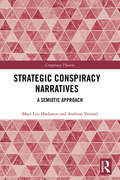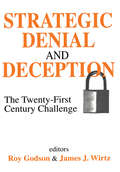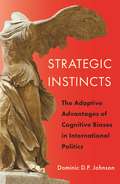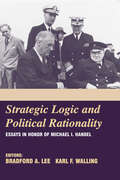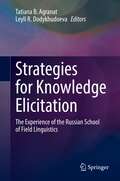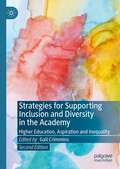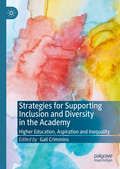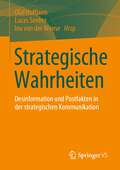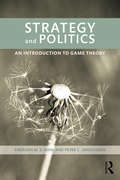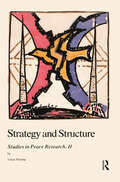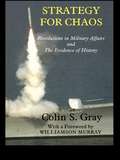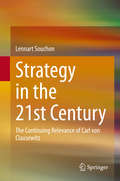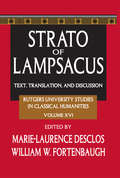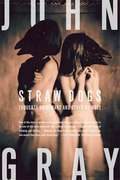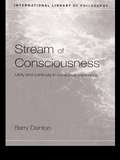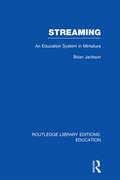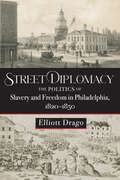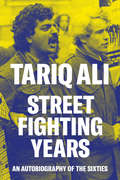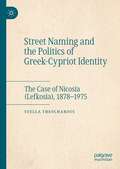- Table View
- List View
Strangers Drowning: Grappling with Impossible Idealism, Drastic Choices, and the Overpowering Urge to Help
by Larissa MacfarquharWhat does it mean to devote yourself wholly to helping others? In Strangers Drowning, Larissa MacFarquhar seeks out people living lives of extreme ethical commitment and tells their deeply intimate stories; their stubborn integrity and their compromises; their bravery and their recklessness; their joys and defeats and wrenching dilemmas. A couple adopts two children in distress. But then they think: If they can change two lives, why not four? Or ten? They adopt twenty. But how do they weigh the needs of unknown children in distress against the needs of the children they already have? Another couple founds a leprosy colony in the wilderness in India, living in huts with no walls, knowing that their two small children may contract leprosy or be eaten by panthers. The children survive. But what if they hadn't? How would their parents' risk have been judged? A woman believes that if she spends money on herself, rather than donate it to buy life-saving medicine, then she's responsible for the deaths that result. She lives on a fraction of her income, but wonders: when is compromise self-indulgence and when is it essential? We honor such generosity and high ideals; but when we call people do-gooders there is skepticism in it, even hostility. Why do moral people make us uneasy? Between her stories, MacFarquhar threads a lively history of the literature, philosophy, social science, and self-help that have contributed to a deep suspicion of do-gooders in Western culture. Through its sympathetic and beautifully vivid storytelling, Strangers Drowning confronts us with fundamental questions about what it means to be human. In a world of strangers drowning in need, how much should we help, and how much can we help? Is it right to care for strangers even at the expense of those we are closest to? Moving and provocative, Strangers Drowning challenges us to think about what we value most, and why.From the Hardcover edition.
Strangers at the Bedside: A History of How Law and Bioethics Transformed Medical Decision Making
by David J. RothmanWhat caused physicians in the USA to confront committees, forms, and active patients? Tracing the revolution that transformed the doctor-patient relationship, this book takes the reader into the laboratory and the examining room, tracing the development of new technologies and social attitudes.
Strangers in Our Midst: The Political Philosophy of Immigration
by David MillerHow should democracies respond to the millions who want to settle in their societies? David Miller's analysis reframes immigration as a question of political philosophy. Acknowledging the impact on host countries, he defends the right of states to control their borders and decide the future size, shape, and cultural make-up of their populations.
Strangers in the City: The Atlanta Chinese, Their Community and Stories of Their Lives (Studies in Asian Americans)
by Jianli ZhaoBased largely on interviews from residents of Atlanta's Chinese community, this book provides new insights on the rise of Asian communities in the Southeast United States since the US immigration policy changes in 1965.
Strangers, Gods and Monsters: Interpreting Otherness
by Richard KearneyFirst published in 2002. Routledge is an imprint of Taylor & Francis, an informa company.
Strata: Stories from Deep Time
by Laura Poppick"[A]n extraordinary book." —Marcia Bjornerud, author of Turning to Stone A revelatory journey through four moments in Earth’s deep past, and their lessons for our future. The epic stories of our planet’s 4.54-billion-year history are written in strata—ages-old remnants of ancient seafloors, desert dunes, and riverbeds striping landscapes around the world. In this brilliantly original debut work, science writer Laura Poppick decodes strata to lead us on a journey through four global transformations that made our lives on Earth possible: the first accumulations of oxygen in the atmosphere; the deep freezes of "Snowball Earth"; the rise of mud on land and accompanying proliferation of plants; and the dinosaurs’ reign on a hothouse planet Poppick introduces us to the researchers who have devoted their careers to understanding the events of deep time, including the world’s leading stegosaur scientist. She travels to sites as various as a Minnesotan iron mine that runs half a mile deep and a corner of the Australian Outback where glacial deposits date from the coldest times on Earth. Ultimately, she demonstrates that the planet’s oceans, continents, atmosphere, life, and ice have always conspired to bring stability to Earth, even if we are only just beginning to understand how these different facets interact. A work in the tradition of John McPhee, Strata allows us to observe how the planet has responded to past periods of environmental upheaval, and shows how Earth’s ancient narratives could hold lessons for our present and future.
Strategic Conspiracy Narratives: A Semiotic Approach (Conspiracy Theories)
by Mari-Liis Madisson Andreas VentselStrategic Conspiracy Narratives proposes an innovative semiotic perspective for analysing how contemporary conspiracy theories are used for shaping interpretation paths and identities of a targeted audience. Conspiracy theories play a significant role in the viral spread of misinformation that has an impact on the formation of public opinion about certain topics. They allow the connecting of different events that have taken place in various times and places and involve several actors that seem incompatible to bystanders. This book focuses on strategic-function conspiracy narratives in the context of (social) media and information conflict. It explicates the strategic devices in how conspiracy theories can be used to evoke a hermeneutics of suspicion – a permanent scepticism and questioning of so-called mainstream media channels and dominant public authorities, delegitimisation of political opponents, and the ongoing search for hidden clues and coverups. The success of strategic dissemination of conspiracy narratives depends on the cultural context, specifics of the targeted audience and the semiotic construction of the message. This book proposes an innovative semiotic perspective for analysing contemporary strategic communication. The authors develop a theoretical framework that is based on semiotics of culture, the notions of strategic narrative and transmedia storytelling. This book is targeted to specialists and graduate students working on social theory, semiotics, journalism, strategic communication, social media and contemporary social problems in general.
Strategic Denial and Deception: The Twenty-First Century Challenge
by James J. Wirtz Roy GodsonDoes foreign denial and deception threaten the interests of contemporary democracies? Strategic denial and deception (D&D) has emerged as a little understood challenge to security in general, and the intelligence community in particular. To gain advantages, adversaries seek to deny critical information about their own activities and capabilities, and to decieve foreign governments. In recent years, Iraq, India, Somalia, Colombian criminal groups, and terrorists, for example, have all used D&D successfully against the United States. Denial and deception is a low cost, potentially high impact to level political, military, and economic playing fields, particularly against strong opponents.Concerns about the threat of denial and deception have waxed and waned since the end of World War II. Sometimes it shaped assessments about the former Soviet Union, for example. At other times, such as the end of the Cold War, such threats appear to fade into insignificance. This volume considers whether globalization, proliferating communication technologies, and the dissemination of vast amounts of information make effective foreign denial and deception more or less likely. Contributors also examine whether more information and data sources make policymakers better informed or simply create confusion.Drawing on lessons learned from historical experiences, the authors propose ways to minimize future challenges. Chapters include ""Elements of Strategic Denial and Deception,"" by Abram Shulsky; ""Conditions Making for Success and Failure of D&D,"" by Barton Whaley; ""Conditions Making for Success and Failure of D&D,"" by M.R.D. Foot; ""Conditions Making for Success and Failure of D&D,"" by J. Bowyer Bell; ""Arms Control,"" by Lynn M. Hansen; and ""Prescription: Detecting Deception-Practice, Practitioners, and Theory,"" by Barton Whaley and Jeffrey Busby.While there are previous books about celebrated D&D cases, from Troy to Pearl Harbor and D-Day, no work attempts to assess how these instruments o
Strategic Instincts: The Adaptive Advantages of Cognitive Biases in International Politics (Princeton Studies in International History and Politics #172)
by Dominic D. Johnson"A very timely book."—Anne-Marie Slaughter, CEO of New AmericaHow cognitive biases can guide good decision making in politics and international relationsA widespread assumption in political science and international relations is that cognitive biases—quirks of the brain we all share as human beings—are detrimental and responsible for policy failures, disasters, and wars. In Strategic Instincts, Dominic Johnson challenges this assumption, explaining that these nonrational behaviors can actually support favorable results in international politics and contribute to political and strategic success. By studying past examples, he considers the ways that cognitive biases act as “strategic instincts,” lending a competitive edge in policy decisions, especially under conditions of unpredictability and imperfect information.Drawing from evolutionary theory and behavioral sciences, Johnson looks at three influential cognitive biases—overconfidence, the fundamental attribution error, and in-group/out-group bias. He then examines the advantageous as well as the detrimental effects of these biases through historical case studies of the American Revolution, the Munich Crisis, and the Pacific campaign in World War II. He acknowledges the dark side of biases—when confidence becomes hubris, when attribution errors become paranoia, and when group bias becomes prejudice. Ultimately, Johnson makes a case for a more nuanced understanding of the causes and consequences of cognitive biases and argues that in the complex world of international relations, strategic instincts can, in the right context, guide better performance.Strategic Instincts shows how an evolutionary perspective can offer the crucial next step in bringing psychological insights to bear on foundational questions in international politics.
Strategic Logic and Political Rationality: Essays in Honor of Michael I. Handel
by Bradford A. Lee Karl F. WallingOne of three volumes in honour of the teaching and scholarship of the late Michael I. Handel, this book details the universal logic of strategy and the ability of liberal-democratic governments to address this logic rationally.Treating war as an extension of politics, the diverse contributors (drawn from the United States, the United Kingdom, Australia and Israel) explore the difficulties in matching strategy to policy, especially in free societies.
Strategies for Knowledge Elicitation: The Experience of the Russian School of Field Linguistics
by Tatiana B. Agranat Leyli R. DodykhudoevaThis volume provides an overview of experimental methods, approaches, and techniques used by field linguists of the Russian school, and highlights the fieldwork experience of Russian scholars working in regions with a range of languages that differ genetically, typologically, and in the degree of their preservation.The collection presents language and sociolinguistic data relating to fieldwork in diverse languages: Uralic, Altaic, Paleo-Siberian, Yeniseian, Indo-European Iranian, Vietic, Kra-Day, and Mayan languages, as well as pidgin.The authors highlight the fieldwork techniques they use, and the principles underlying them.The volume’s multidisciplinary approach covers linguistic, ethnolinguistic, sociolinguistic, educational, and ethnocultural issues. The authors explore problems associated with the study of minority languages and indicate diverse and creative techniques for data elicitation. Close collaboration with speakers lies at the core of their approach. The collection presents strategies for eliciting systems of knowledge from mother-tongue speakers, triggering linguistic self-awareness, and providing semantic and morphosyntactic context for their languages.This publication is intended for academics, and for specialists in the field of linguistics and minority and indigenous languages. It will also benefit students as a guide to field research, as well as language activists, interested in documenting and preserving their mother tongue.
Strategies for Supporting Inclusion and Diversity in the Academy: Higher Education, Aspiration and Inequality
by Gail CrimminsThis book explores tried and tested strategies that support student and faculty engagement and inclusion in the academy. These strategies are anchored by a brief exploration of the history and effect/s of exclusion and deprivilege in higher education. However, while many publications exploring academic inequality focus on the causes and impacts of structural, psychological and cultural exclusion based on racism, sexism, classism and ableism, they rarely engage in interventions to expose and combat such de/privilege. Capturing examples of inclusive practices that are as diverse as student and faculty populations, these strategies can be easily translated and employed by organisations, collectives and individuals to recognise and combat social and academic exclusion within higher education environments.
Strategies for Supporting Inclusion and Diversity in the Academy: Higher Education, Aspiration and Inequality
by Gail CrimminsThis book explores tried and tested strategies that support student and faculty engagement and inclusion in the academy. These strategies are anchored by a brief exploration of the history and effect/s of exclusion and deprivilege in higher education. However, while many publications exploring academic inequality focus on the causes and impacts of structural, psychological and cultural exclusion based on racism, sexism, classism and ableism, they rarely engage in interventions to expose and combat such de/privilege. Capturing examples of inclusive practices that are as diverse as student and faculty populations, these strategies can be easily translated and employed by organisations, collectives and individuals to recognise and combat social and academic exclusion within higher education environments.
Strategische Wahrheiten: Desinformation und Postfakten in der strategischen Kommunikation
by Olaf Hoffjann Lucas Seeber Ina von der WenseStrategische Kommunikation zielt mit ihren kontingenten Wirklichkeitsbeschreibungen seit jeher auf gesellschaftliche Wahrheitsmodelle. Wie häufig gesellschaftliche Wahrheitsmodelle auf strategische Kommunikationsbemühungen zurückgehen, auf Unwahrhaftigkeit beruhen und damit zumindest zeitweise zu strategischen Wahrheiten werden, zeigen eindrucksvoll zwischenzeitlich geglaubte Wahrheiten, die sich als Lüge entpuppt haben: von Walter Ulbrichts „Niemand hat die Absicht, eine Mauer zu errichten“ über Hitlers Tagebücher bis hin zu den Massenvernichtungswaffen im Irak. Die erfolgreichen Kampagnen der Brexiteers und von Donald Trump 2016 haben diesem Thema zu neuer und bislang ungeahnter Aufmerksamkeit verholfen. Während die Themen Desinformation und postfaktische Gesellschaft die Journalismus-, politische Kommunikations- und Medienethikforschung aktuell zu dominieren scheinen, ist das Schweigen der deutschsprachigen und internationalen PR- und Organisationskommunikationsforschung auffällig. Dies ist umso bemerkenswerter, weil die PR-Wissenschaft in der Vergangenheit immer wieder versucht hat, ihren Gegenstand zu schärfen, indem sie sich am Begriff der Propaganda abgearbeitet hat. Daraus müsste eigentlich eine Affinität für das Thema Desinformation resultieren. Aber genau das Gegenteil ist offensichtlich der Fall: Hat sich die PR-Wissenschaft gerade deshalb nicht mit Desinformation beschäftigt, weil sie sich so dezidiert von Propaganda und darin eingeschlossenen desinformierenden und manipulativen Techniken abgrenzen will? Was sind die Gründe hierfür? Glauben wir, bereits alles zum Thema gesagt zu haben? Liegt dies daran, dass sich die PR- und Organisationskommunikationsforschung seit jeher vor allem für Unternehmen und weniger für politische und Non-Profit-Organisationen interessiert? Oder fühlen wir uns hier schlicht und ergreifend nicht zuständig? Es scheint offenkundig höchste Zeit zu sein, sich wieder eingehend mit Fragen der Desinformation aus der Perspektive der strategischen Kommunikationsforschung zu befassen. Die Beiträge des Tagungsbandes fokussieren hierzu auf neue theoretische Perspektiven, normative Bewertungen und empirische Befunde.
Strategy and Politics: An Introduction to Game Theory
by Peter C. Ordeshook Emerson NiouStrategy and Politics: An Introduction to Game Theory is designed to introduce students with no background in formal theory to the application of game theory to modeling political processes. This accessible text covers the essential aspects of game theory while keeping the reader constantly in touch with why political science as a whole would benefit from considering this method. Examining the very phenomena that power political machineries—elections, legislative and committee processes, and international conflict, the book attempts to answer fundamental questions about their nature and function in a clear, accessible manner. Included at the end of each chapter is a set of exercises designed to allow students to practice the construction and analysis of political models. Although the text assumes only an elementary-level training in algebra, students who complete a course around this text will be equipped to read nearly all of the professional literature that makes use of game theoretic analysis.
Strategy and Structure: Studies in Peace Research
by Johan NiezingThis text offers a selection of writings that are more definite versions from past conferences. Including papers from lectures at the Inter-University Centre of Postgraduate Studies, Dubrovnik, Yugoslavia (course: Theories on Development, Conflict and Peace, 1975 and 1976); from conferences of the VVK (the Belgian-Dutch Association of Peace Researchers) in 1976 and 1977; Chapter V was also a contribution to the 1977 meeting of the Dutch Association for Political Science. Most of the chapters of this book have also been published earlier in one way or another. Chapter II has been published in a Dutch journal, ‘Transactie’ and in a modified English version in the Bulletin of Peace proposals, 1976, 2. Chapter IV appeared in a Dutch journal Tntermediair’, 1974, 1. Chapter V was published originally in the Annals of the Faculty of Economic, Social and Political Science of our Brussels University. Chapter VI has its own history: it can be viewed as a very condensed version of a rather extensive study in the Dutch language: ‘Budgetteringssysteem en Bewapeningsproces; een studie over de politieke en polemologische betekenis van PPBS’ (published as Vol. Ill of a series of publications in the Dutch language of our Brussels Polemological Centre).
Strategy for Chaos: Revolutions in Military Affairs and the Evidence of History (Strategy and History)
by Colin GrayIn this volume, Professor Colin Gray develops and applies the theory and scholarship on the allegedly historical practice of the 'Revolution in Military Affairs' (RMA), in order to improve our comprehension of how and why strategy 'works'.The author explores the RMA hypothesis both theoretically and historically. The book argues that the conduct of an RMA has to be examined as a form of strategic behaviour, which means that, of necessity, it must "work" as strategy works. The great RMA debate of the 1990s is reviewed empathetically, though sceptically, by the author, with every major school of thought allowed its day in court.The author presents three historical RMAs as case studies for his argument: those arguably revealed in the wars of the French Revolution and Napoleon; in World War I; and in the nuclear age. The focus of his analysis is how these grand RMAs functioned strategically. The conclusions that he draws from these empirical exercises are then applied to help us understand what, indeed, is - and what is not - happening with the much vaunted information-technology-led RMA of today.
Strategy in the 21st Century: The Continuing Relevance of Carl von Clausewitz
by Lennart SouchonThis book presents a detailed discussion of Clausewitz's principal lines of thought and methods of implementation. It elaborates on his main objective of laying a foundation for the education of up-and-coming creative, knowledgeable and experienced future leaders. The book encourages reflection and study in strategic thinking in order to transform knowledge into genuine capability. The book explores the question of what a twenty-first-century decision-maker can learn from these strategic lines of thought. It bridges the gap between philosophical theory and strategic interaction in conflicts with an equal opponent. Readers learn to understand and employ the clash of wills, attack and defence, and friction, and in essence the necessary virtues of a strategic commander.The findings presented help to identify the essential features in complex decision-making situations and developing possible courses of strategic action from a holistic standpoint. As such, the book is a must read for strategists, business practitioners, and scholars of political leadership and management interested in a better understanding of strategy and decision-making.
Strato of Lampsacus: Text, Translation and Discussion (Rutgers University Studies in Classical Humanities)
by William FortenbaughVolume 16 of Transaction's acclaimed Rutgers University Studies in Classical Humanities series, continues the work of Project Theophrastus on the School of Aristotle. The subject of this volume is Strato of Lampsacus in Mysia on the Hellespont. Strato was the third head of the Peripatetic School after Aristotle and Theophrastus. He succeeded the latter in c. 286 BCE and was in turn succeeded by Lyco of Troas in c. 268. Diogenes Laertius describes Strato as a distinguished person who became known as "the physicist," because more than anyone else he devoted himself to the careful study of nature. Strato's concern with the physical world is well attested by the titles of his books: On the Void, On the Heaven, and On the Wind. His other books point to a keen interest in human physiology, animal life and diseases. But it would be a mistake to think that Strato was uninterested in other areas of philosophic concern. Indeed, he wrote works on logic, first principles, theology, politics and ethics. None of this work survives intact, but the reports that have come down to us reveal much of present-day interest. Included is a new and complete edition of the ancient sources, together with a critical apparatus to the ancient texts, an English translation, and notes to the translation.
Straw Dogs: Thoughts on Humans and Other Animals
by John GrayThe British bestseller Straw Dogs is an exciting, radical work of philosophy, which sets out to challenge our most cherished assumptions about what it means to be human. From Plato to Christianity, from the Enlightenment to Nietzsche and Marx, the Western tradition has been based on arrogant and erroneous beliefs about human beings and their place in the world. Philosophies such as liberalism and Marxism think of humankind as a species whose destiny is to transcend natural limits and conquer the Earth. John Gray argues that this belief in human difference is a dangerous illusion and explores how the world and human life look once humanism has been finally abandoned. The result is an exhilarating, sometimes disturbing book that leads the reader to question our deepest-held beliefs. Will Self, in the New Statesman, called Straw Dogs his book of the year: "I read it once, I read it twice and took notes . . . I thought it that good." "Nothing will get you thinking as much as this brilliant book" (Sunday Telegraph).
Stream of Consciousness: Unity and Continuity in Conscious Experience (International Library of Philosophy)
by Barry DaintonStream of Consciousness is about the phenomenology of conscious experience. Barry Dainton shows us that stream of consciousness is not a mosaic of discrete fragments of experience, but rather an interconnected flowing whole. Through a deep probing into the nature of awareness, introspection, phenomenal space and time consciousness, Dainton offers a truly original understanding of the nature of consciousness.
Streaming: An Education System in Miniature (Routledge Library Editions: Education)
by Brian JacksonIn this volume a streamed school is studied in detail and parents’ responses are recorded. Eleven plus is (and has been) under criticism, but many children are selected by a ‘seven plus’ because they are streamed into A, B or C classes. Few children escape the label once it is pinned on them – less than six in one hundred change their stream. The study shows that on a national sample the date on which a child is born – irrespective of his ability – affects his or her stream at the age of 7 and his results at eleven plus. Finally ten streamed schools are compared, academically and socially, with ten unstreamed schools. In the final chapters the author makes practical proposals by which primary schools could recognise and increase the flow of gifted children.
Street Diplomacy: The Politics of Slavery and Freedom in Philadelphia, 1820–1850
by Elliott DragoAn illuminating look at how Philadelphia's antebellum free Black community defended themselves against kidnappings and how this "street diplomacy" forced Pennsylvanians to confront the politics of slavery.As the most southern of northern cities in a state that bordered three slave states, antebellum Philadelphia maintained a long tradition of both abolitionism and fugitive slave activity. Although Philadelphia's Black community lived in a free city in a free state, they faced constant threats to their personal safety and freedom. Enslavers, kidnappers, and slave catchers prowled the streets of Philadelphia in search of potential victims, violent anti-Black riots erupted in the city, and white politicians legislated to undermine Black freedom. In Street Diplomacy, Elliott Drago illustrates how the political and physical conflicts that arose over fugitive slave removals and the kidnappings of free Black people forced Philadelphians to confront the politics of slavery. Pennsylvania was legally a free state, at the street level and in the lived experience of its Black citizens, but Pennsylvania was closer to a slave state due to porous borders and the complicity of white officials. Legal contests between slavery and freedom at the local level triggered legislative processes at the state and national level, which underscored the inability of white politicians to resolve the paradoxes of what it meant for a Black American to inhabit a free state within a slave society. Piecing together fragmentary source material from archives, correspondence, genealogies, and newspapers, Drago examines these conflicts in Philadelphia from 1820 to 1850. Studying these timely struggles over race, politics, enslavement, and freedom in Philadelphia will encourage scholars to reexamine how Black freedom was not secure in Pennsylvania or in the wider United States.
Street Fighting Years: An Autobiography of the Sixties
by Tariq AliOne of the world&’s best-known radicals relives the early years of the protest movementWhat makes a young radical? Reissued to coincide with the fiftieth anniversary of 1968, Street Fighting Years captures the mood and energy of an era of hope and passion as Tariq Ali tracks the growing significance of the 1960s protest movement, as well as his own formation as a leading political activist.Through his personal story, he recounts a counter-history of a sixties rocked by the Prague Spring, student protests on the streets of Europe and America, the effects of the Vietnam war, and the aftermath of the revolutionary insurgencies led by Che Guevara. It is a story that takes us from Paris and Prague to Hanoi and Bolivia, encountering along the way Malcolm X, Bertrand Russell, Marlon Brando, Henry Kissinger, and Mick Jagger.This edition includes the famous interview conducted by Tariq Ali and Robin Blackburn with John Lennon and Yoko Ono In 1971.
Street Naming and the Politics of Greek-Cypriot Identity: The Case of Nicosia (Lefkosia), 1878–1975
by Stella TheocharousThis book is the first to explore street names and street-naming in the formation of a Greek-Cypriot identity in the cityscape of Nicosia between 1878 and 1975. Rather than treating toponymy as a direct linguistic act of spatial orientation, the book approaches street-naming as a contested practice involving those shared symbols and representations used to depict official history and collective identity as part of a political process. It considers how street names are part of the symbolic politics of space, and how authorities transformed the streets of Nicosia into arenas of struggle for the control of symbolic and material space. It documents historical efforts over the course of a century to impose a ‘geography of forgetting’ to buttress national identity and to cast out the ‘other’ from space — both literally and symbolically — so as to achieve territorial dominance and political legitimacy. The book is another step towards the development of a global perspective on the critical study of street-naming, thereby refining and expanding our knowledge of the political dynamics involved in the process. In their commemorative capacity, street names belong to the politics of public memory and identity.
